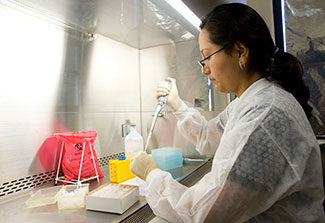Grateful for progress toward a disease-free world
November / December 2017 | Volume 16, Issue 6
Opinion by Fogarty Director Dr Roger I Glass
Terrifying news accounts of recent deaths from Ebola, flesh-eating bacteria, HIV/AIDS, Zika and even the plague can give the misleading impression we are at greater risk than ever. But we are fortunate to live in a time when - thanks to scientific advances that have produced lifesaving vaccines and treatments - we can actually begin to imagine a disease-free world.
As we gather with our families to give thanks this season, it's appropriate to acknowledge the commitment of scientists around the globe who work tirelessly, often under difficult and dangerous circumstances, to solve the world's most pressing health problems. As we have all been reminded, diseases know no borders so it's important that we share our expertise and data, and form strong research collaborations - especially in locations with the fewest resources. After all, we are all only as strong as our weakest link.
At Fogarty, we support research and training programs to develop the next generation of global health leaders and increase scientific capacity in low- and middle-income countries (LMICs). We believe this work is critical to improving health around the world, in addition to bringing great dividends to Americans.

Photo by David Snyder for Fogarty/NIH
Fogarty acknowledges the commitment of scientists around
the globe who work tirelessly to solve the world's most
pressing health problems.
Fogarty trainees in many cases provide the bedrock that makes NIH research possible in low-resource settings. When HIV/AIDS emerged as a global crisis in the 1980s, Fogarty began programs to build scientific capacity in the LMICs where the suffering was greatest. Since then, research advances have informed care and treatment so that a diagnosis of HIV/AIDS has been transformed from a death sentence to a manageable chronic illness. Fogarty trainees played a significant role in research discoveries including development of rapid diagnostics for detecting and monitoring HIV infections, new drugs for treatment and new strategies for prevention, such as avoiding mother-to-child transmission, voluntary medical male circumcision and treatment as prevention.
From a security standpoint, nations with scientific expertise are better prepared to contain infectious disease outbreaks when they occur. As we saw with Ebola in 2014, the countries that had well-trained researchers who were networked with global experts were able to swiftly manage the Ebola cases that crossed their borders, unlike some nations in West Africa, which had few technical or human resources to deploy. That's why Fogarty has launched a program that is specifically directed at building partnerships and supporting training for scientists in Guinea, Liberia and Sierra Leone.
Training foreign researchers helps U.S. scientists take advantage of unique opportunities for discovery. When an unusual number of babies were born with microcephaly in rural Brazil, scientists trained by Fogarty to investigate Chagas disease redirected their research to examine the Zika virus, which was suspected of causing the spate of birth defects. Ongoing studies show adults can also be affected and that the virus can remain in the central nervous system for longer than originally expected.
We may learn the key to preventing the ravages of Alzheimer's disease - which is expected to strike one in three Americans and cost $1 trillion annually by 2050 - by studying an extended family with hereditary, early-onset Alzheimer's in rural Colombia. Fogarty has provided critical scientific training so that local researchers can perform brain scans, genetic analysis and other sophisticated approaches. That has already enabled a clinical trial of a U.S. manufactured drug that might help stop Alzheimer's at its earliest stage.
As we take stock during Fogarty's 50th year of existence, we measure much of our success in the people whose training we have supported. As they have advanced in their careers, they have in turn mentored the next generation, multiplying the value of our investment and increasing its impact. By partnering with researchers around the globe, we can hasten progress. Together, we can someday achieve a world without disease.
A version of this article, Imagine a disease-free world, was originally published as part of Research!America's Public Health Thank You Day campaign.
More Information
To view Adobe PDF files,
download current, free accessible plug-ins from Adobe's website.